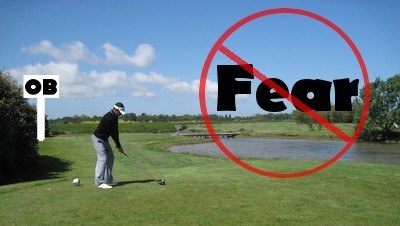
Of all the things that can destroy a round of golf, one of the most overlooked is fear.
Every golfer has felt its effects. On the first tee you take out the driver, spotting water on the right and out of bounds on the left. You become nervous at the prospect of failing in front of your peers, the fear short-circuiting your concentration and causing a tense, timid swing.
To be successful in golf you must learn to control your fear of failure. Try these tips to manage – if not banish -- those negative thoughts:
- Learn to “shape” shots left-to-right and right-to-left. This allows you to skirt trouble no matter which side of the hole it's on.
- If your natural golf shot is a fade, aim down the left edge of the fairway (right-handed golfer) to use the entire width of the fairway. If you hit it straight, you wind up in the left side of the fairway. A fade finds the middle of the fairway, and a slice finishes in the right side of the fairway. Knowing your own tendencies can reduce your fear, before you even swing the golf club.
- On tight holes with lots of trouble, use a fairway wood or hybrid instead of the driver. Downsizing to a shorter club with more loft increases accuracy and shrinks the fear factor.
- Good course management involves sound assessment of risk and reward based on your skills. Forego shots that are beyond your ability to achieve; being comfortable with a decision keeps fear at bay.
- Zeroing in on your target with aim and alignment priorities will help prevent negative thoughts.
- Focus on the process of hitting the shot, not the potential results. Develop a consistent pre-shot routine and follow it every single time. This will keep your mind off the possible outcomes and on those things you can control.
- Fear expands and creates tension if you stand still over the ball for too long. Keep your body moving with a one-piece golf club waggle, which prevents the arms and hands from getting rigid.

Next time you prepare for a difficult shot, simply say to yourself, “Have no fear.” You'll be surprised how powerful you feel when facing up to your fears.
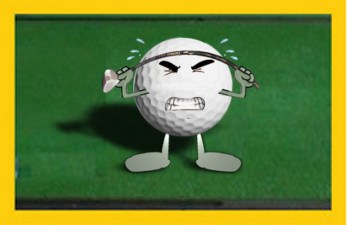
How to Golf Without Fear
When viewed in comparison with many of the other popular sports in the world, golf wouldn't seem to be a game that comes with a lot of fear. If you play baseball, for example, you have to worry about getting hit with a fastball while standing in the batter's box. Or, if you are a football player, you have to worry about getting tackled by a linebacker who you never see coming. The list can go on and on. Many sports bring along very real physical fears.
In golf, of course, the fear is not of a physical nature. Unless you happen to get hit by an errant shot from somewhere else on the course, you should walk off the 18th green unscathed. However, that doesn't mean that you will be free from fear for the entire day. The fear in this game comes in the way of threats to your score and your performance. Many different situations which will pop up on the course can lead you to feel fearful, including having to hit a long shot over water, or having to hit a short putt with something on the line. Every golfer knows the feeling of being afraid while getting ready to swing – and that is a powerful feeling, even if your fears are not the physical kind.
In this article, we are going to provide advice which will hopefully help you to play golf without fear. Playing golf without fear is desirable for a couple of reasons. First, it will be more fun. Fear is not a pleasant feeling, and you will enjoy your time on the course more when you are not trying to fight off fear at every turn. Also, playing without the fear of failure in the back of your mind is going to allow you to perform at a higher level. There is a degree of tension which usually comes along with fear, and those who are tense will always have a hard time making a quality swing. By learning to set your fear to the side, you can develop a game which is consistently able to perform at a high level, even when the pressure is on.
To successfully eliminate the fear from your golf game, you are going to need to go into this process with an open mind. It is easy to simply stick with the same old approach you have always had to your game, remaining in the same mindset round after round. Of course, taking the same approach is going to lead to the same results. Before you read the rest of this article, be sure that your mind is open to new ways of thinking about the game. Only when that is the case will you really be able to make any progress.
All of the content below is written from the perspective of a right-handed golfer. If you happen to play left-handed, please take a moment to reverse the directions as necessary.
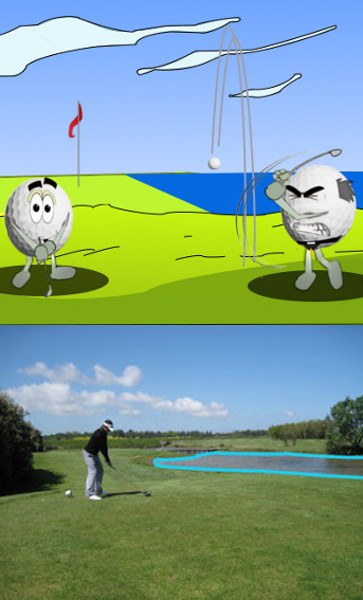
The Common Sources of Fear on the Links
If you have played even one round of golf in your life, you already are familiar with the feelings of fear that can exist during the average round. It is a common misconception in this game that only players competing at the highest levels – on the PGA Tour, for example – will feel fear as they golf. That simply isn't the case. This is an experience that is shared across the game, from highly accomplished professionals on down to complete beginners.
In this section, we are going to address some of the common sources of fear on the golf course. Once you have a better understanding of where fear comes from, you can move forward to figure out how you can get rid of it.
- Fear of embarrassment. This is one of the most powerful feelings you will experience on the golf course. In many cases, when hitting a golf shot, there will be at least one other person watching you. That person may be someone you know – such as a friend who came out to play with you – or it could be a stranger you happened to be paired with at the golf course. In fact, it doesn't even have to be someone playing in your group. There might be others standing around the first tee when you start, for instance, or there could be a homeowner out on his or her back patio watching the golfers go by. Whatever the case, you may feel the fear of potential embarrassment in this situation. If you hit a bad shot while others are watching, you might feel self-conscious about what that person is thinking of you and your abilities. This fear can cause you to play below your actual ability level, and it can take away from the fun you have on the course as well. In most cases, this is a fear which is a bigger problem for beginners than experienced players. As you gain more and more experience on the links you will probably get used to other people watching you play, and you will no longer care what they might be thinking.
- Fear of finding a hazard. When you reach a point on the golf course where you have to navigate a particular hazard with your next shot, you might feel fear as a result of this challenge. The most obvious example is a shot over water. This type of shot puts fear in the heart of the average player, as any kind of miss-hit is usually going to lead to a lost ball and a penalty. Of course, it doesn't have to be a water hazard to have this effect. There are out of bounds stakes to worry about on most courses, as well as patches of long grass or maybe thick areas of trees which will swallow up an errant swing. Whatever the hazard happens to look like, the effect on your emotions is often the same. You feel some fear in the back of your mind, you rush through the shot just to get it over with as quickly as possible, and you make a poor swing. To stay away from hazards effectively, the first thing you need to do is accept their presence on the course. Nearly all golf courses have at least a couple hazards, and you are going to have to take them on with confidence to complete your round successfully. Instead of giving in to the fear and playing scared, you will have to rise to the occasion and meet the challenge head on.
- Fear of failing on an easy shot. One of the interesting psychological parts of golf is the fact that most players get far more nervous on easy shots than they do on difficult ones. A perfect example is a short putt. When faced with a three-foot putt over flat ground, many golfers will be quite nervous about missing. When dealing with a five-foot putt that breaks hard from one side to the other, however, the typical golfer will be far more relaxed. How could that be? It all comes down to expectations, and it goes back to the topic of embarrassment. It is embarrassing to miss an easy shot. If you miss a hard shot, who cares? It was hard anyway, and most golfers wouldn't have been able to handle it. With an easy shot, there is the pressure of expectation that comes along with not wanting to look like a beginner. In order to avoid making easy shots more difficult than they need to be, you need to understand that all shots are more-or-less created equal in golf. Sure, you might face more challenges on some shots than others, but they can all go right, and they can all go wrong. There is no such thing as a 'gimme' in this game.
There are plenty of opportunities to feel fearful when you play golf. If you are going to reach your potential as a golfer – and have as much fun as possible in the process – you need to work on developing strategies to get around some of these common fears. In the rest of this article, we will provide you with ideas on how exactly you can get past your fears to play the best golf of your life.
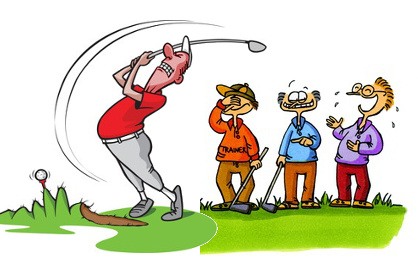
Playing in Front of Other People
Unless you can afford to build your own private golf course, you will always have to be ready for the possibility of playing golf in front of others. Sure, you might have the course to yourself occasionally when the weather is poor, but that will be the exception rather than the rule. By and large, you should plan on at least one or two other people watching you every time you hit a shot.
Since there is nothing you can do to change this fact of life on the course, you might as well start working to overcome this fear. The points below will hopefully help you gain control over this fear – and maybe even turn it into an advantage.
- Other golfers hit bad shots too. The biggest reason that you shouldn't worry about other golfers watching you play is the fact that all of those golfers have hit bad shots as well. Even if you do hit a terrible shot, the person watching you has certainly hit shots which were equally as bad in the past. All golfers have to start somewhere, and that somewhere is usually with an ugly swing and even uglier results. Believe it or not, even the golfers at the top of the PGA Tour were once complete beginners. In the end, this means that every other golfer on the course can relate. There is simply nothing to be ashamed of when you hit a bad shot in this game – it's just part of golf.
- Don't let others interfere with your fun. Golf is supposed to be fun. This is something you do with your recreational time, and you spend some of your hard-earned money on it as well. If you aren't having fun, it is hard to think of much of a reason why you should stay out on the links. So, with that in mind, it would be a shame to let the judgmental eye of another golfer get in the way of your enjoyment. So what if someone wants to think you are a terrible player? How does that affect your life in any way? You should be out on the course enjoying yourself, challenging yourself to do better, and appreciating the fresh air. If another person has nothing better to do with their day than to judge your performance, that is their own problem. Have your own fun, and let the rest of it go.
- Don't take yourself too seriously. An important part of this discussion has to do with your own outlook on the game of golf. If you are like most players these days, you just might be taking things a bit too seriously. In all likelihood, you aren't going to be competing for a major championship trophy anytime soon. Since this is just a hobby and not a job, you don't need to take it so seriously. And, and the same time, you don't need to take yourself so seriously. You shouldn't be worried about others laughing at your poor shots because you should be laughing right along with them. The best way to play this game is to relish your great shots and laugh about your bad ones. At the end of the day, you are just hitting a ball around a field with a stick. When viewed through that lens, it is hard to take anything that happens on the course too seriously.
It is okay to feel a little bit nervous when playing in front of other golfers. After all, human beings often feel shy or fearful when doing something in front of others. Public speaking is a common fear which highlights this point perfectly. However, you shouldn't let that fear get a point where it takes away from your enjoyment of the game in any meaningful way. We hope the tips above will help you keep your mind pointed in a positive direction regardless of who may be watching you swing.

Using Strategy to Eliminate Fear
If many of the fears you have during a round of golf come from the design of the course itself, you really need to focus in on your course management abilities. To put it bluntly, most amateur golfers have lousy course management skills. In fact, this part of the game is something the average player never even bothers to think about. Most golfers simply hit the ball as hard as they can on every shot and hope for the best. It should be no surprise that this 'strategy' usually comes up short.
You will be surprised to find just how much fear you can take out of the game if you are willing to play smart whenever possible. What do we mean by playing 'smart'? Basically, you are going to look for opportunities to reduce your risk while still putting the ball in a good position to play the next shot. This will almost certainly mean playing more conservatively than you do now. Conservative golf might not always be as exciting as going for the green at every opportunity, but it does lead to lower scores at the end of the day.
With regard to taking fear out of your game, you are going to reduce the number of times you feel fearful on the course simply because you won't be hitting as many dangerous shots. For example, rather than trying to carry a water hazard to reach a par five green in two shots, you could choose to lay up and play your third shot into the green from a good angle. This kind of plan would take the risk of that second shot out of play, meaning you would have no reason to be afraid.
This kind of thinking can be used in many different situations. You can club down to a three wood or hybrid on the tee instead of hitting your driver. Or, you can play away from the hole with an approach shot in order to avoid a deep bunker. Taking stress out of your game should always be seen as a good thing. Despite what most amateurs seem to believe, you don't actually need to be an aggressive golfer to post low scores. Some of the best players in the world accomplish their goals by playing it safe and taking advantage of the opportunities that the golf course provides.
While we do believe that playing a conservative style of golf is going to be best for most amateurs, there still will be an opportunity from time to time to be aggressive. Keep your mind open to aggressive shots while defaulting back to the safe option whenever anything makes you think twice. You only want to go for it when you have everything lined up in your favor. That means you have a good yardage, the shot fits your ball flight, you are playing well, etc. It is a mistake to be aggressive when you have any doubt at all in the back of your mind – that doubt will turn into fear, and that fear will ruin your swing. Be conservative in most cases, and play aggressive when everything happens to line up just right.
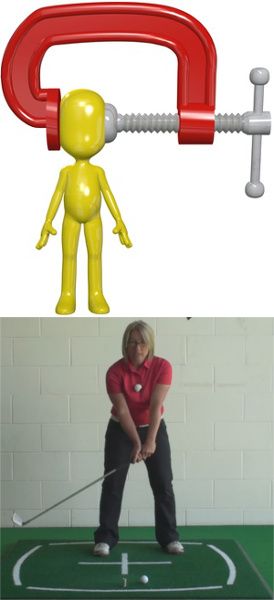
Final Points on Fear
Before we conclude, there are a few other points which we would like to make on the topic of fear in golf.
- Take your game up a level. One surprising way you can get over your fear on the course is to challenge yourself by playing in a competition or two. By experiencing the pressure that comes along with playing in a tournament, you will quickly learn how to push your fears to the side while doing your best to perform under pressure. It doesn't matter if you are a high-handicapper, you can still use this point to your advantage. Most golf courses hold tournaments for players of all skill levels, meaning you don't have to spend hours working on your game to enter and have fun. In addition to meeting new people and having a great time, you will teach yourself to confront your golf fears in a positive manner.
- Rely on your positive experiences. When you do feel some level of fear creeping into your mind on the course, think back to your positive golf experiences in order to fight that fear with confidence. By picturing some of the great shots you have hit over the years, you can remember that you are good enough to conquer the challenge at hand. Golf can be an intimidating game at times, so you can never have enough positive images in your mind.
- Welcome the nerves. It is common for amateur golfers to do their best to push nerves away when they feel them coming on. This is the wrong way to approach your game. There is actually nothing wrong with being nervous – those nerves can help you play better if you channel them into focus and determination. Instead of running the other direction, accept the fact that you are going to be nervous and play well anyway.
It might seem odd to connect two things like fear and golf, but they do have a close connection – and every experienced golfer knows that to be true. While it might not be the kind of fear that you experience in other sports, it is very real nonetheless. We hope the advice provided in this article will help you cope with the fears you encounter during your next round. To reach your goals in this game, you not only have to improve on your physical skills, but you have to learn how to manage your mind better as well. Good luck!





